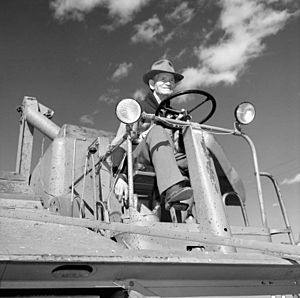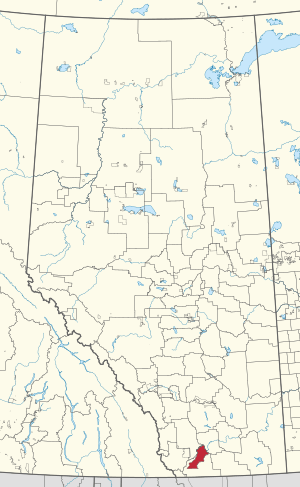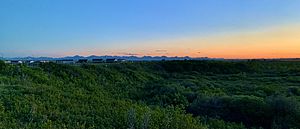Blood 148 facts for kids
Quick facts for kids
Blood 148
|
|||
|---|---|---|---|
| Blood Indian Reserve No. 148 | |||

James Gladstone on his combine harvester
|
|||
|
|||

Location in Alberta
|
|||
| First Nation | Kainai Nation | ||
| Country | Canada | ||
| Province | Alberta | ||
| Municipal district | Cardston | ||
| Headquarters | Stand Off | ||
| Government | |||
| • Body | Blood Tribe Council | ||
| Area | |||
| • Total | 1,413.87 km2 (545.90 sq mi) | ||
| Population
(2021)
|
|||
| • Total | 4,572 | ||
| Time zone | UTC−7 (MST) | ||
| • Summer (DST) | UTC−6 (MDT) | ||
| Highways | Highway 2 | ||
Blood 148 is a special area of land in Alberta, Canada. It is known as a First Nations reserve. This land is home to the Blood people, also called the Kainai. The reserve was created as part of an important agreement called Treaty 7.
The Blood 148 reserve is managed from a community called Stand Off. This community is located on the reserve's northwest side. The reserve covers most of the land between the cities of Fort MacLeod, Lethbridge, and Cardston. Important highways like Highway 2, Highway 5, and Highway 509 run through it. Two main rivers, the St. Mary River and the Belly River, flow through the land.
Blood 148 is very large. It covers about 1,413.87 square kilometers (545.90 square miles). This makes it the biggest reserve in all of Canada. It is also the third most populated reserve. Only Six Nations and Akwesasne have more people. In 2019, a court decided that the Blood Tribe should have even more land. This was based on the original promises made in Treaty 7. The reserve is next to the cities of Fort MacLeod and Lethbridge. It also borders the town of Cardston.
Who Lives in Blood 148?
In 2006, about 4,177 people lived on Blood 148. They lived in about 1,250 homes. This was an 8.4% increase from 2001. By 2018, the Alberta Government reported that the population had grown to 4,713 people.
The reserve is very large, so the people are spread out. In 2006, there were about 3.0 people per square kilometer. This is called the population density. As of December 2013, government records showed that the Blood band had a total of 11,791 registered members. These members live on reserves 148 and 148A.
 | Sharif Bey |
 | Hale Woodruff |
 | Richmond Barthé |
 | Purvis Young |




